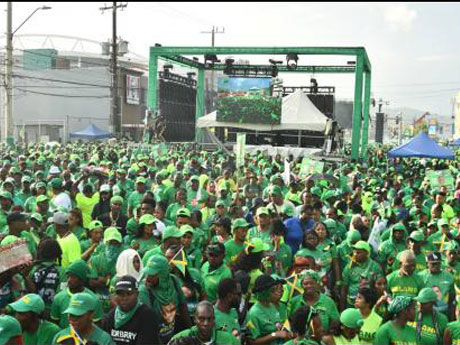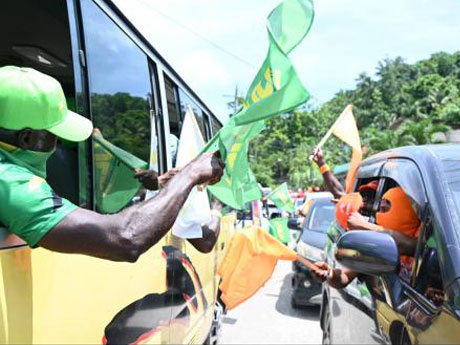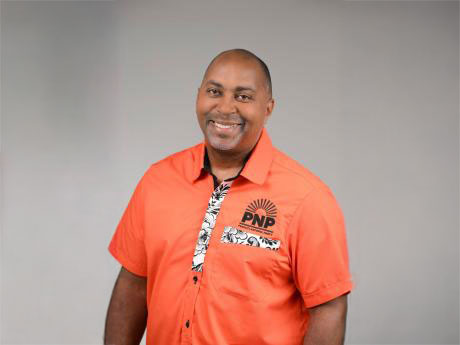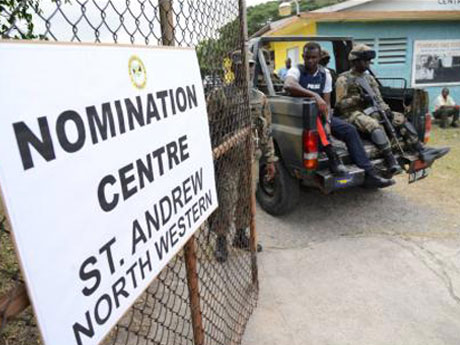With 189 candidates nominated, JLP and PNP brace for fierce electoral clash Jamaica’s two main political parties are claiming to have the greater momentum on the ground, two weeks out from a general election that is expected to be fie

By:
Source: Jamaica Gleaner

Image caption: Jamaica Labour Party supporters out in their numbers for a mass rally in Half-Way Tree, St Andrew, on August 10.
The opposition People’s National Party (PNP) is holding onto a razor-thin, but declining lead over the governing Jamaica Labour Party (JLP), as a new public opinion poll shows more undecided voters now favouring the JLP fewer than two weeks out from the September 3 general election.
The RJRGLEANER-commissioned Don Anderson poll, conducted by Anderson’s Market Research Services Limited, August 2-11, among 1,008 registered voters, has captured a momentum shift in favour of the incumbent JLP.
It shows the JLP’s support increasing by 4.3 percentage points from 29.6 per cent in May/June to 33.9 per cent in August, its biggest gain in five polls. The undecided bloc fell 6.4 points, from 37.8 per cent to 31.4 per cent.
The PNP also climbed, moving 2.1 points from 32.6 per cent to 34.7 per cent, though its increase was smaller than the JLP’s. The 0.8 percentage point gap is well within the poll’s ±3 per cent margin of error, rendering the contest a statistical dead heat.
The results show a significant collapse of the PNP’s lead, which stood at a commanding nine percentage points in September of last year. At that time, the PNP garnered 39.3 per cent support, compared to the JLP’s 30.2 per cent.
A substantial 31.4 per cent of the electorate remains uncommitted, with 14.3 per cent saying they are “not sure yet” and a significant 17.1 per cent declaring they are “not going/planning to vote”. This large bloc of undecided and disaffected voters represents the critical battleground where the election may be won or lost.
The JLP has seized on the numbers as clear evidence of a rising tide in their favour, coming on the back of a mass rally held on August 10, where Holness announced the election date.
“It’s clear, momentum JLP; the Labourites are upbeat, energised and enthused,” declared JLP spokesman Marlon Morgan during an interview with journalist Dionne Jackson Miller on Radio Jamaica’s Beyond the Headlines yesterday.
He pointed out that since the June poll, the JLP has gained 4.3 percentage points, while the PNP has seen a smaller increase of 2.1 points, which he characterised as “hobbling along”. Morgan confidently stated that the party is in “full campaign mode”, with a “magnetic” prime minister promoting the party’s record of achievements over the last nine years in office.
He said in “a matter of days”, the party will launch its manifesto. The PNP launched its manifesto on August 12, the day after the fieldwork ended for the poll.
PROJECTING CONFIDENCE
The PNP is projecting confidence, arguing that their lead, however slim, will hold. Dr Dayton Campbell, the party’s general secretary, dismissed concerns about loss of momentum by referencing the party’s performance in the 2024 local government elections.
“When we went into the local government [elections] last year, we were one point behind in the same Don Anderson poll and we were able to pull out the popular vote, we were able to win more divisions and get the same number of mayors. So, being one point ahead, we’re still confident that we’ll be able to win this election.”
Campbell is banking on specific policy proposals, such as building 50,000 low-income houses and removing the tax from overtime pay, to energise key voting blocs.
Political commentator and trade unionist Helene Davis-Whyte analyses the situation as one where the JLP’s unofficial campaigning over the past few months has paid dividends, allowing them to gain momentum.
She believes the deciding factor may not be persuasion, but mobilisation on September 3, a nod to the established view that elections are won on the day.
“It may come down at the end of the day to how each party is able to get out its base,” Davis-Whyte stated. She noted the historical perception that the PNP has a larger base, and that the party appears more united now than in the last two election cycles, which could encourage supporters, who previously stayed home, to vote.
The ultimate challenge, she argues, is engaging the growing cohort of Jamaicans who are disaffected with the political process. She noted that the data over the last five polls show that shifts in the undecided voters have trended to the JLP.
Anderson said the latest results preceded the Nomination Day activities and “sets the stage for the final three weeks of campaigning by the main parties”.
He noted that drivers of the support for the PNP comprised five main factors, top of which was the desire “to get rid of the JLP”, which was cited by 29 per cent of those who intend to vote for the Opposition party, reinforcing the notion of anti-incumbency sentiment. Some 22.9 per cent say they will vote for the PNP out of loyalty.
KEY DRIVERS
Other key drivers of support for the PNP include 16 per cent who say they will vote to give them a chance to fix the country’s challenges, 13 per cent who believe the PNP will do more for the people, and 12 per cent say they simply have more confidence in the PNP.
Support for the JLP was driven by three main factors, most important of which was the belief that they are doing “a good job”, followed by 29 per cent who will vote for them so that they can continue the projects they started, and 23 per cent who will do so out of loyalty to the party.
The August poll data reveals distinct patterns of support across gender and age, painting a complex picture of the Jamaican electorate.
On gender, there is a clear gender split in voter intention. Men show a stronger preference for the PNP, with 39.6 per cent planning to vote for them, compared to 35.8 per cent for the JLP. Women, however, lean slightly towards the JLP, with 34.3 per cent support, versus 29.5 per cent for the PNP.
When asked which party has the interest of the people more, a similar pattern emerges: 41.7 per cent of men chose the PNP, while 40.0 per cent of women selected the JLP. But, overall, 40.7 per cent of the respondents said the JLP has the best interest of Jamaicans compared, with 39.9 per cent for the PNP.
Regarding age groups, the PNP’s strength lies with older voters, earning support from 45.6 per cent of respondents in the 55-64 age group and 41.6 per cent of those 65 and over. The JLP finds its strongest support among the 35-44 age cohort, where it leads the PNP 39.1 per cent to 35.2 per cent.
“This is consistent with the general pattern of support for each of the two main parties, with the PNP appealing to the older age cohort and the JLP to the middle age cohort as well as females,” Anderson explained.
Crucially, younger voters appear the most disengaged. Among those age 18-24, a combined 52.5 per cent are either unsure or not planning to vote. For the 25-34 age group, that figure is 40 per cent.
The JLP’s campaign slogan, ‘Choose Jamaica’, is built around touting macroeconomic stability, a significant year-on-year reduction in murders of more than 40 per cent, a 3.3 per cent unemployment rate, poverty cuts, and no new taxes for most of Holness’ tenure.
Speaking at a party meeting in Clarendon South Eastern in May, Holness said the next phase of his administration’s agenda is focused on building the local economy so that Jamaicans can “experience your own prosperity”.
Earlier this week, Holness downplayed a favourability poll finding that has him ahead of Opposition Leader and PNP President Mark Golding by only two percentage points (41%- 39%).
Golding claimed on Monday that “the momentum is definitely with the People’s National Party”.
The PNP is campaigning under the theme ‘Time Come’ and has accused the Holness administration of neglecting poor and working-class Jamaicans and weakening key institutions of accountability.
It has also partly focused its campaign on the prime minister’s decision to seek another term despite his income filings not being certified by the Integrity Commission, following an inconclusive investigation into illicit enrichment.
“Our country is at a crossroads ... . The JLP path is not working for most Jamaicans. Cost of living is crushing families, corruption is running wild in government ...,” he said at a rally in St Mary on August 3.
Join the Discussion
#JaVotes2020 TweetsElection News


Robinson promises review of pay package for public-sector workers Opposition Spokesman on Finance Julian Robinson says if the People’s National Party (PNP) forms the government it will undertake a review of the compensation package im

The machinery of the two major political parties will be at full throttle today as the prospective candidates and their supporters are expected to whip up frenzied carnival-type celebrations that accompany Nomination Day exercises across Jamaica&rsquo